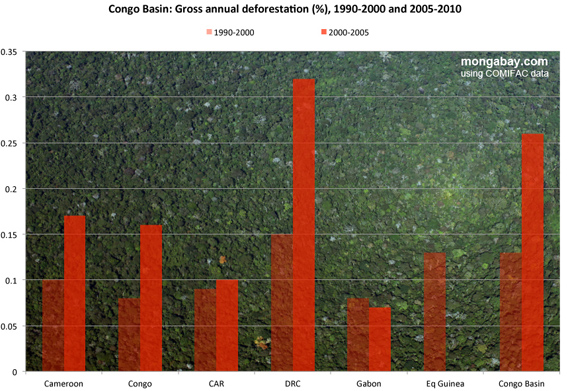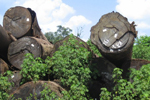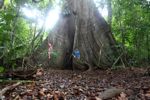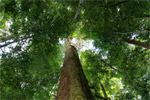The Forest Stewardship Council (FSC), a body that certifies forest management practices, has revoked all certificates granted to the Danzer Group, a multinational logging company, over alleged human rights abuses by one of its former subsidiaries in the Democratic Republic of Congo (DRC), reports Bloomberg.
According to a complaint filed by Greenpeace, the subsidiary, Siforco, provided financial and logistical support to Congolese police and military forces in a May 2011 attack against a community protesting the company’s logging operations. Security forces committed acts of violence, including rape, and destroyed property in the village.
Danzer, which sold Siforco in February 2012, said that Siforco was “forced” to provide support during the attack. It added that the police went to the village to recover equipment stolen from Siforco, according to Bloomberg.
Greenpeace filed its complaint 18 months ago. In a statement issued today, the FSC said it will terminate all of its contracts with Danzer. The “disassociation”, as the termination is known, “is the most severe sanction that FSC can impose”, according to the body.
“Based on the unanimous recommendation of the Complaints Panel, which spent several months analyzing the case, and whose work was also reviewed by a Board Complaints Resolution Committee, the Board of Directors decided that Danzer was in violation of FSC’s Policy for Association,” said Kim Carstensen, Director General of FSC, in a statement. “Our continued association with the Danzer Group clearly puts FSC’s credibility and reputation at risk.”
Greenpeace welcomed the move.
“Greenpeace is pleased the FSC is showing that its Policy for Association has teeth and is not risking its reputation by being associated with the Danzer Group due to its involvement in human rights violations. We find this landmark decision critical for the credibility of the FSC,” said Judy Rodrigues, senior forest campaigner with Greenpeace International. “This case shows that the FSC needs to urgently establish certification safeguards in high risk areas where there are high levels of corruption and where good governance, the rule of law and organized civil society are all lacking.”

Deforestation in the Congo Basin. Click image to enlarge.
According to Bloomberg, the disassociation affects Danzer’s subsidiary Industrie Forestiere de Ouesso (IFO), which has the largest FSC-certified logging operation in the Congo Basin.
The FSC has certified some 154 million hectares (380 million acres) of forests worldwide based on “environmental, economic, and social” criteria. The standard, which is set by membership, has seen a fair share of controversy over the years. Some industry groups view it as too restrictive, while some environmentalists complain the standard is too weak and allows first-time logging of primary forests. Greenpeace, which is an FSC member, says it is trying to strengthen the environmental aspects of the standards from within the body.
Related articles
Activists blast World Bank on continued support of industrial rainforest logging
(02/11/2013) Two environmental activist groups blasted the World Bank over its reported decision to block a probe into its support of industrial-scale rainforest logging.
Timber, paper demand contributing to destruction of rainforests
(09/06/2012) Demand for timber and paper is contributing to destruction of the world’s most biodiverse rainforests and worsening climate change, argues a new report issued Tuesday by the Union of Concerned Scientists (UCS).
Experts: sustainable logging in rainforests impossible

(07/19/2012) Industrial logging in primary tropical forests that is both sustainable and profitable is impossible, argues a new study in Bioscience, which finds that the ecology of tropical hardwoods makes logging with truly sustainable practices not only impractical, but completely unprofitable. Given this, the researchers recommend industrial logging subsidies be dropped from the UN’s Reducing Emissions from Deforestation and Forest Degradation (REDD+) program. The study, which adds to the growing debate about the role of logging in tropical forests, counters recent research making the case that well-managed logging in old-growth rainforests could provide a “middle way” between conservation and outright conversion of forests to monocultures or pasture.
Industrial logging leaves a poor legacy in Borneo’s rainforests

(07/17/2012) For most people “Borneo” conjures up an image of a wild and distant land of rainforests, exotic beasts, and nomadic tribes. But that place increasingly exists only in one’s imagination, for the forests of world’s third largest island have been rapidly and relentlessly logged, burned, and bulldozed in recent decades, leaving only a sliver of its once magnificent forests intact. Flying over Sabah, a Malaysian state that covers about 10 percent of Borneo, the damage is clear. Oil palm plantations have metastasized across the landscape. Where forest remains, it is usually degraded. Rivers flow brown with mud.
Greenpeace calls for global REDD standards to reduce negative impacts of forest carbon projects
(06/26/2012) Greenpeace has launched a consultation process to establish global standards for Reducing Emissions from Deforestation and Degradation (REDD+) projects.
Big trees, like the old-growth forests they inhabit, are declining globally

(01/26/2012) Already on the decline worldwide, big trees face a dire future due to habitat fragmentation, selective harvesting by loggers, exotic invaders, and the effects of climate change, warns an article published this week in New Scientist magazine. Reviewing research from forests around the world, William F. Laurance, an ecologist at James Cook University in Cairns, Australia, provides evidence of decline among the world’s ‘biggest and most magnificent’ trees and details the range of threats they face. He says their demise will have substantial impacts on biodiversity and forest ecology, while worsening climate change.
Logging of primary rainforests not ecologically sustainable, argue scientists

(01/25/2012) Tropical countries may face a risk of ‘peak timber’ as continued logging of rainforests exceeds the capacity of forests to regenerate timber stocks and substantially increases the risk of outright clearing for agricultural and industrial plantations, argues a trio of scientists writing in the journal Biological Conservation. The implications for climate, biodiversity, and local economies are substantial.
FSC mulls controversial motion to certify plantations responsible for recent deforestation

(06/24/2011) Members of the Forest Stewardship Council (FSC), meeting in Malaysia this week for its General Assembly, will consider various changes to the organization, including a vote on a controversial motion that would open the door—slightly at first—to sustainable-certification of companies that have been involved in recent forest destruction for pulp and paper plantations. Known as Motion 18, the change is especially focusing on forestry in places where recent deforestation has been rampant, such as Indonesia and Malaysia.
Timber certification is not enough to save rainforests

(06/02/2010) In the 1980s and 1990s pressure from activist groups led some of the world’s largest forestry products companies and retailers to join forces with environmentalists to form the Forest Stewardship Council (FSC), a certification standard that aims to reduce the environmental impact of wood and paper production on natural forests. Despite initial skepticism on whether buyers would pay a premium for greener forest products, FSC quickly grew and by 2000 had become a standard in many markets, including Europe and the United States. Companies like Home Depot, Lowe’s, and Ikea are today strong supporters of the FSC. But the FSC has not been without controversy. In recent years some activists have voiced concern about FSC standards as well as the credibility of auditors that certify timber operations. Among the initiative’s supporters is the Rainforest Action Network (RAN), a group best known for its aggressive protest tactics. RAN says engagement with the FSC is better than the alternative: leaving the timber industry to devise its own sustainability standards.
Forest certification system needs reform to ensure sustainability – report
(11/04/2008) Demand for wood products is ultimately one of the largest drivers of global deforestation through both direct clear-cutting and selective logging, which increases a forest’s vulnerability to fire and subsequent clearing and disturbance by other actors, including hunters, subsistence farmers, land speculators, ranchers and agro-industrial firms. Reducing the detrimental environmental impacts of meeting wood demand is critical to protecting the world’s forests as healthy, productive and resilient ecosystems.







